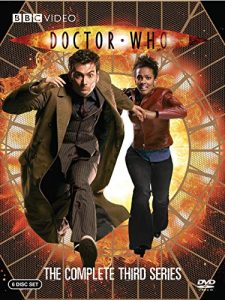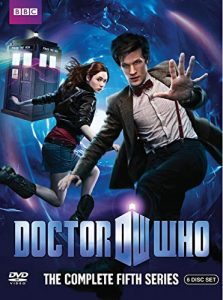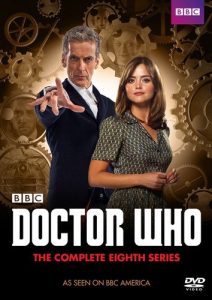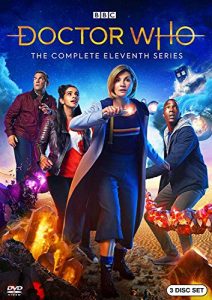Doctor Who is an extremely long-running (1963-1989 for the original series, 2005-present for the relaunch) series about an alien with the power to travel through time. The Doctor, an ages-old member of a highly advanced race called the Time Lords, goes on adventures across time and space with his special time machine, the TARDIS which resembles a British police call box. He gains and loses various human companions over the course of his journeys, in which he tries to thwart the schemes of dangerous alien species and prevent dangerous cataclysms. The Doctor’s greatest asset is his ability to “regenerate,” which allows him to come back from fatal injuries in a new body and persona. This has allowed many actors to portray the Doctor over the years and offer their own distinct performances to characterize him.
In 2005, the BBC relaunched its famed TV series Doctor Who after a long absence from the airwaves. Since new episodes had not been seen on BBC since 1989, the “new Who” had a lot of work to do in establishing a younger fanbase and becoming a ratings standard-bearer for the BBC once more. The American TV movie from 1996 had not succeeded in launching its own series, and the Doctor remained an obscure character in the US outside of PBS pledge drives and die-hard scifi fans. With a larger budget, an acclaimed showrunner in Russell T. Davies, and a change in format from 30-minute episodes in serial format to hour-length episodes and season-long story arcs, the relaunched Doctor Who was substantially different from the show’s original run to help it better compete in a more expansive and difficult television market. Over the course of 15 years, Doctor Who would not only succeed in creating a younger UK fanbase for the series, it would finally establish the Doctor’s mainstream popularity in the United States.
CRRL's collection of Doctor Who episodes on DVD. Includes all seasons of the relaunch and what DVDs of the older run we have.
The Sixth Doctor (Colin Baker) is in the middle of a civil war between his hated enemies, the Daleks, that takes place on the funeral planet Necros. A chance to see what the series was like before budget and time cuts started to hurt it later into the Sixth Doctor's run.
All 13 episodes featuring Christopher Eccleston as the Ninth Doctor, the shortest serving Doctor. Marked the debut of Russell T. Davies as showrunner.
David Tennant's debut as the Tenth Doctor occurred in a season that laid the groundwork for the spin-offs Torchwood and The Sarah Jane Adventures.
The Ninth Doctor: The Relaunch’s Dawn
After several false starts and a 2003 web series titled Scream of the Shalka featuring Richard E. Grant as the Doctor, an announcement was made in 2004 that Doctor Who would return to BBC airwaves the following year. BBC also announced that Christopher Eccleston would play the Ninth Doctor, officially confirming that it would continue the story of the earlier run rather than “rebooting” Doctor Who’s continuity. Though the first season of the launch was an immediate ratings success in the UK, there was little initial interest in the United States. The series remained so obscure that it would only debut on the U.S. Sci-Fi Channel in 2006, a full year later.
Eccleston’s Doctor appeared for only the 13 episodes of the relaunch’s first season, the shortest run of any of the 13 main Doctors. Although these new episodes had a larger budget and a flashier production than the original run, the season lacked the confidence of the show’s later seasons and the original run; notably, all the episodes took place on Earth, unlike most Doctor Who seasons. The decision of the showrunners to emulate the format of American TV and have all the episodes be part of a season-long story arc also meant that the individual episodes had less opportunity to stand out on their own as individual narratives than the serials of the older Who format, such as Pyramids of Mars. Nonetheless, several acclaimed episodes did come out of this season. Standouts included “Dalek,” the story of the Doctor’s encounter with one of his surviving archenemies, and “The Empty Child,” a World War II adventure where the Doctor’s companion Rose encountered another time traveler on a mission. “The Empty Child” was also Stephen Moffat’s first Doctor Who script, and its success would bode well for his future with the series.
The Tenth Doctor: The David Tennant Years
After Eccleston’s brief run as the Doctor, David Tennant would assume the role and bring both a ratings boom in the UK and the beginnings of mainstream popularity to Doctor Who in the US. Tennant would would play the Doctor for three seasons that lasted from 2005 to 2009, giving him a long time to put his stamp on the character. Tennant was a long-time fan of the series who had portrayed various characters in Doctor Who audio dramas, as well as a minor role in Scream of the Shalka. He debuted in the special episode “The Christmas Invasion,” a story of Earth’s invasion by the nightmarish Sycorax aliens. Other memorable episodes in the second season included “School Reunion,” which reintroduced the Doctor's beloved companions Sarah Jane Smith and K9, and “Army of Ghosts/Doomsday,” a two-part episode detailing the war between two of the Doctor’s most infamous enemies, the Cybermen and the Daleks. The return of Sarah Jane Smith and the robotic dog K9 in “School Reunion” would prove so popular that a spinoff series, The Sarah Jane Adventures, would feature them as the main characters.
Tennant’s strong run as the Doctor would continue in the subsequent two seasons. Season 3 would bring with it a variety of interesting episodes, including “Daleks in Manhattan,” the story of the Doctor’s efforts to stop Dalek/human hybrids and “pig slaves” from running amuck in 1930s Manhattan, and “Blink,” which introduced the statue-like Weeping Angels to the codex of memorable Doctor Who monsters. The Tenth Doctor would undergo a significant character arc over the season, as his sadness over the loss of his beloved companion Rose Tyler at the end of Season 2 would slowly darken his opinions of both humanity and the nature of time and the Universe as a whole. Season 4 would continue the strong writing trend with such memorable episodes as “Planet of the Ood,” in which the Doctor investigates a company enslaving a race of telepathic squid, and “Silence in the Library,” a Hugo Award-winning episode that marked the debut of fan favorite character River Song. “Silence in the Library” also marked the return of Stephen Moffat to the Doctor Who writing staff; shortly after the episode premiered, the BBC announced that it would promote Moffat to showrunner on Who starting the following season, ending the Russell T. Davies era.
Beyond the Limit: Matt Smith, the Eleventh Doctor
Season 5 of Doctor Who would mark a major change in the series, as it marked the debut of Matt Smith as the Doctor and Stephen Moffat as showrunner. The acclaimed season opener, “The Eleventh Hour,” introduced Amy Pond, the Doctor’s new companion, and featured a mysterious telepathic adversary called Zero. Matt Smith’s Doctor possessed a great deal of youthful energy, but retained the wisdom and intellect of an old man, as he was the last of the Doctor’s thirteen regenerations. Other standout episodes in Season 5 included “The Time of Angels,” in which Moffat’s Weeping Angels returned to menace the Doctor once more, and “The Pandorica Opens,” when the Doctor tries to prevent the Universe from collapsing upon itself. “The Pandorica Opens” would win a Hugo Award, continuing Moffat’s legacy of excellent Who writing.
Matt Smith would portray the Doctor for two more seasons. Season 6 would bring memorable episodes, such as “The Impossible Astronaut,” in which the Doctor is confronted by a mysterious and malevolent order of aliens, and “The Doctor’s Wife,” a Neil Gaiman-written adventure that won both a Ray Bradbury Award and a Hugo Award for its script. Season 6 would show a new, darker side to the Eleventh Doctor, as a more spiteful and vindictive aspect of his nature would surface as he reacted to the hardships he faced. He would still have his companions Amy, Rory and River, and they would continue to work with him into Season 7. After adventures such as “Asylum of the Daleks” and “The Angels Take Manhattan,” the Doctor would lose his longtime friends and find himself with a new companion, the barmaid Clara. Suffering from both the loss of his old friends and the growing knowledge of his own final death, the Eleventh Doctor’s once-jovial characterization would become dominated with sadness and melancholy. He would finally confront his own doom in “The Name of the Doctor.” In a rare twist for the series, the Doctor would end one of his lives by not only accomplishing all of his goals and delivering a memorable final speech summing up his existence, but also getting rewarded a future thirteen lives to continue exploring space and time. This conclusive and happy ending, in which a Doctor finally managed to fix something instead of inadvertently throwing the Universe into further chaos or failing to prevent a catastrophe he had anticipated, helped make the Eleventh Doctor a fan favorite and contributes greatly to fans’ positive memories of his time.
Strange Changes: Peter Capaldi, the Twelfth Doctor
Befitting the unusual and paradoxical tendencies of the Doctor’s regenerations, Peter Capaldi’s Doctor was quite different from, and in some ways a reverse of, Matt Smith’s. Whereas Matt Smith’s Doctor often behaved like an old man in a young man’s body, Peter Capaldi’s portrayal often seemed like an old man cursed with the inexperience of a young man. He was plagued with lost memories of the background of his companion Clara and even basic technical knowledge of how to operate the TARDIS throughout Season 8. Some of his memorable adventures from this season included “Into the Dalek,” where the Doctor finds a rare virtuous member of the hated Dalek race; “Listen,” in which Clara uses the TARDIS to visit her boyfriend’s past; and “Dark Water,” when the Doctor is confronted by a surprising new form of his Time Lord archnemesis, The Master.
The Twelfth Doctor and Clara would return for Season 9, which was both Clara’s last season and a time of change and deepening of Capaldi’s Doctor characterization. The Doctor would first use an electric guitar in the season’s premier episode, “The Magician’s Apprentice,” a talent from Capaldi’s old career as a punk rock guitarist that would appear from time to time throughout his remaining seasons as Doctor. The ninth season would feature a lengthy ongoing storyline involving Ashildr, a Viking girl turned into a resentful immortal by the Doctor who causes a series of tragic events that result in the Doctor finally losing his beloved Clara. In Season 10, he would cope with her loss and find a new companion, Bill Potts. The Doctor refocused his drive to save as many people as he could despite the risks and unhappiness that it brought to him over the season. He was confronted with surprising dangers in episodes such as “Oxygen,” where he confronted zombies on a space station where the air was rationed to ensure a corporation’s maximum profitability, and “Extremis,” in which he dealt with a book called Veritas which caused anyone who read it to commit suicide. In an episode that was as much a meta-analysis of the sadness that Moffat was finally leaving as showrunner as it was a scripted way to end Capaldi’s contract, the Twelfth Doctor’s adventures concluded in “Twice Upon a Time,” in which the Doctor saw previous incarnations of himself while struggling with the decision to regenerate once more.
After Moffat: Jodie Whittaker, the Thirteenth Doctor
Major changes would take place on Doctor Who’s creative team as Season 11 began. Stephen Moffat was no longer a writer or showrunner and was replaced by Chris Chibnall, who had previously written the drama series Broadchurch. Another reason the feel of the show changed was because Murray Gold, who had composed music for the series since its revival in 2005, had been replaced by Segun Akinola. The biggest change of all was that the Doctor, who had previously been portrayed only by male actors, was now played by a woman in the thirteenth incarnation. She would have three new companions in her debut episode, “The Woman Who Fell to Earth,” and together they fought almost entirely new threats over the course of Season 11, ranging from an automated shipping company in “Kerblam!” to a race of shroud-like aliens called the Remnants in “The Ghost Monument.” The adventures of Season 11 were all designed as self-contained stories, allowing the audience and writing staff alike to ease into the introduction of a new and very different period in Doctor Who history.
After four Doctors, three showrunners, and numerous companions, the relaunched Doctor Who is still going strong. Like most broadcasters, the BBC will face heavy competition from streaming services going into the 2020s, leaving Doctor Who and its other scripted programs with an uncertain future. The concept of whether the Doctor can find and adapt to a complex, changing world and establish a new identity with each regeneration is a recurring theme throughout the series. This will also be the tale of Doctor Who in the 2020s, as the series won’t be able to rest on the laurels of Davies’ and Moffat’s work and will have to chart a new way forward once more to avoid the fate of the original run in the 1980s. Our collection offers the best of Doctor Who’s run through the 2000s and 2010s, allowing you to chart the series’ evolution as you ponder what may lie ahead in a universe with near infinite possibilities.





